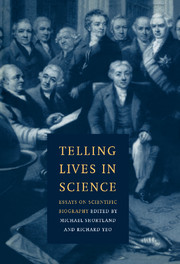Book contents
- Frontmatter
- Contents
- List of contributors
- Preface
- Introduction
- 1 Existential projects and existential choice in science: science biography as an edifying genre
- 2 Life-paths: autobiography, science and the French Revolution
- 3 From science to wisdom: Humphry Davy's life
- 4 Robert Boyle and the dilemma of biography in the age of the Scientific Revolution
- 5 Alphabetical lives: scientific biography in historical dictionaries and encyclopaedias
- 6 The scientist as hero: public images of Michael Faraday
- 7 ‘Tactful organising and executive power’: biographies of Florence Nightingale for girls
- 8 Taking histories, medical lives: Thomas Beddoes and biography
- 9 The scientist as patron and patriotic symbol: the changing reputation of Sir Joseph Banks
- 10 Metabiographical reflections on Charles Darwin
- Index
8 - Taking histories, medical lives: Thomas Beddoes and biography
Published online by Cambridge University Press: 28 October 2009
- Frontmatter
- Contents
- List of contributors
- Preface
- Introduction
- 1 Existential projects and existential choice in science: science biography as an edifying genre
- 2 Life-paths: autobiography, science and the French Revolution
- 3 From science to wisdom: Humphry Davy's life
- 4 Robert Boyle and the dilemma of biography in the age of the Scientific Revolution
- 5 Alphabetical lives: scientific biography in historical dictionaries and encyclopaedias
- 6 The scientist as hero: public images of Michael Faraday
- 7 ‘Tactful organising and executive power’: biographies of Florence Nightingale for girls
- 8 Taking histories, medical lives: Thomas Beddoes and biography
- 9 The scientist as patron and patriotic symbol: the changing reputation of Sir Joseph Banks
- 10 Metabiographical reflections on Charles Darwin
- Index
Summary
Medical biography
The prospects and problems of scientific biography have been extensively discussed in recent years; creativity has been probed and analyses offered of the historical tensions between the private pursuit of science and its public face. If the career of a scientist implants expectations that the biography itself will enshrine ‘scientific’ virtues – factual accuracy and objectivity – the very opposite might be suggested by study of the lives of psychoanalysts. To plumb the murky depths, would not an analyst's biographer need to investigate the unconscious, and thereby advance inferences subjective and unfalsifiable, leading to unfathomable transferences between biographer and biographee? Doubtless tongue in cheek, Freud himself foisted a totally deedoriented deadpan autobiography upon the world, but later non-Freudian accounts of the father of psychoanalysis, notably Ronald Clark's Freud: The Man and the Cause (1980), disappoint because they do little more than skim the surface. If physicians may be situated, vocationally and perhaps temperamentally, somewhere between scientists and psychoanalysts, does that mean that there is, or ought to be, a unique mode of medical biography, to suit the distinctive qualities of their subject? Is there a distinctive genre of medical biography? If not, should there be? These are questions I wish to pose in this chapter. Lest I raise expectations that will be disappointed, let me say from the outset that I cannot pretend to offer any very general or theoretical resolutions. Such a notion would be unrealistic, I believe, in view of the enormous historical diversity of the practice of medicine.
- Type
- Chapter
- Information
- Telling Lives in ScienceEssays on Scientific Biography, pp. 215 - 242Publisher: Cambridge University PressPrint publication year: 1996



